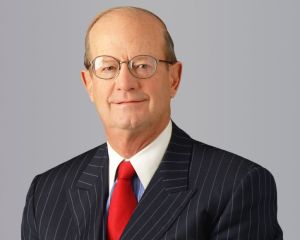Inside the Legacy of John C. Cushman
The Cushman & Wakefield chairman was known for his meticulous dealmaking and his industry advocacy.
During a real estate career that spanned 60 years, John C. Cushman III left indelible marks on the powerful firms he led, and the commercial real estate business at large.
At the time of his passing last week at the age of 82, Cushman was chairman of Global Transactions and chairman of the board of Cushman & Wakefield. The grandson and nephew of the firm’s founders, Cushman was integral to Cushman & Wakefield becoming one of the world’s top brokerage and property management companies. In addition to his leadership prowess, his skills as a broker of complex office leases and large investment sales were legendary, and he was a passionate advocate on behalf of the industry in policy matters.
A dealmaker at heart
Cushman’s career began with Cushman & Wakefield in 1963 in New York City. He moved to Los Angeles in 1967 to start the firm’s first Southern California office. Two years later, C&W’s Western region had grown to be 60 percent of the company’s location. In 1978, Cushman and his twin brother Louis started their own firm, Cushman Realty Corp. Over the next 30 years, Cushman Realty Corp. grew from two offices to operations in 11 cities and 200-plus employees. In 2001, the firm merged with Cushman & Wakefield, and Cushman became global chairman of the board of Cushman & Wakefield Inc. When Cushman & Wakefield was purchased by DTZ in 2015, Cushman had the opportunity to return to his brokerage roots as head of Global Transactions.
Cushman first gained national recognition as a power broker during the office boom of the late 1970s and early 1980s. In Los Angeles, he helped shape the skyline by filling new buildings with corporate heavyweights like Atlantic Richfield Co., Unocal Corp., Crocker Bank, Citicorp, Wells Fargo Bank and Merrill Lynch.
During the same era, he negotiated the largest lease in history: Merrill Lynch’s $3 billion, 25-year deal for 4 million square feet at the yet-to-be-built World Financial Center in New York City. He also sold the firm’s former headquarters.
Other landmark deals during Cushman’s career included headquarters relocations for several of the nation’s largest corporations, including Boeing in Chicago, Burlington Northern in Seattle, UBS in New York City and Standard Oil in Cleveland.
Cushman is credited with pioneering the sophisticated analyses of tenant requirements that are common practice today. He also pioneered “equity deals,” in which tenants take an interest in the projects they are anchoring.
That influence was shared with the brokers and employees who worked alongside Cushman, including John McRoskey, a 10-year employee of Cushman Realty and now a managing director at JLL. “Those who were fortunate to work for him became the collective stars and leaders of the next generation of commercial real estate brokers,” McRoskey told Commercial Property Executive. “He exemplified and demanded from his employees the highest standards of integrity, excellence and performance.”
Cushman was known for inspecting each and every aspect of a building, from elevator speeds to window thickness, in order to achieve the best results for his clients and negotiate the most optimal leases for a given space, according to a 1985 New York Times Magazine profile published shortly after the record-breaking Merrill Lynch deal closed. “Cushman’s negotiating strength rests in part on the confidence corporate executives place in him,” the reporter wrote.
McRoskey witnessed this first-hand. “Cushman standardized the art, the process and the psychology of real estate deal making.” he said.
In 2008, Cushman received CPE’s Lifetime Achievement Award.
An advisor and scholar
Cushman was also known for his extensive advisory and advocacy work, serving on the boards of 14 public corporations, as well as a number of nonprofits, educational, research and philanthropic institutions. Cushman’s roles included seats on the boards of Homeland Security Advisory Council, the University of Southern California’s LUSK Center for Real Estate, the University of Colorado Boulder Business School, Fellows of Claremont University Center and the Boy Scouts of America.
In his time as the director of Real Estate Roundtable, Cushman played a role in developing a number of public real estate policies related to homeland security, capital policy, sustainability and taxes.
Jeffrey DeBoer, the think tank’s president & CEO, said Cushman’s communication skills and empathy were instrumental to the Roundtable’s successes. “He had an uncanny ability to understand the perspective of the person across the table in policy discussions,” DeBoer told CPE. “This skill, coupled with his relentless focus and his many respected relationships, substantially enhanced the Roundtable’s advocacy efforts.”
Cushman’s attention to detail was another one of his important contributions. “He always insisted on being fully factually accurate, and he understood that, in the policy making world, you need to work with everyone in order to be successful,” DeBoer added.
Cushman is survived by his wife Jeanine, his four sons and 10 grandchildren.








You must be logged in to post a comment.